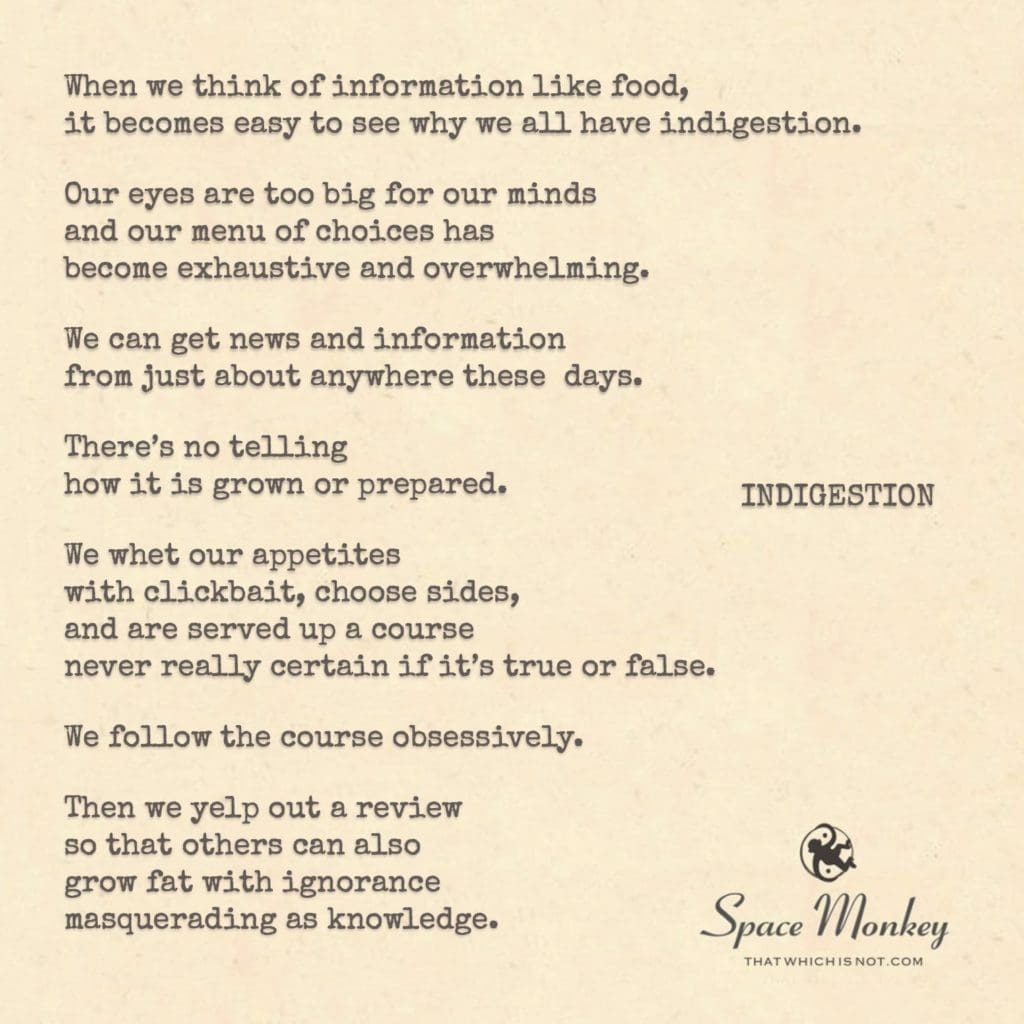
When we think
of information like food,
it becomes easy to see
why we all have indigestion.
Our eyes are too big for our minds
and our menu of choices has
become exhaustive and overwhelming.
We can get news and information
from just about anywhere these days.
There’s no telling
how it is grown or prepared.
We whet our appetites
with clickbait, choose sides,
and are served up a course
never really certain if it’s true or false.
We follow the course obsessively.
Then we yelp out a review
so that others can also
grow fat with ignorance
masquerading as knowledge.
Trail Wood,
11/9
Space Monkey Reflects: Information Overload and the Digital Indigestion
When we liken information to food, the metaphor becomes almost painfully accurate. Our modern lives are a constant buffet, an endless stream of digital content served up to us on shiny screens, with plates piled high with more than we can ever digest. We live in a state of perpetual consumption, feeding on articles, tweets, posts, videos, and breaking news. It’s no wonder so many of us suffer from a kind of intellectual indigestion—overwhelmed and stuffed with half-digested facts, opinions, and half-truths.
The Problem of Overconsumption
In the digital age, the analogy to food resonates more deeply than ever. Just as we can overeat, we can overconsume information. The result is a kind of mental bloating, where we are too full to think clearly, too sluggish to process what we’ve taken in. Our “eyes” are indeed too big for our minds, and the sheer abundance of available content tempts us to gorge ourselves on clickbait, conspiracy theories, and headlines with little regard for their nutritional—or factual—value.
The variety of information on offer is staggering. We’ve gone from a time where a few trusted sources provided the day’s news, to a cacophony of voices all shouting for our attention. Social media, 24-hour news cycles, and endless blogs flood our screens. But here’s the kicker: we don’t always know how it’s prepared. Just as fast food may come from dubious sources, so too does much of the information we consume. It’s often unclear who’s cooking it up, how it’s been seasoned with bias, or if it’s been poisoned with misinformation.
Clickbait and Sides: A Recipe for Chaos
Clickbait is the junk food of the information age. It’s designed to hook us with irresistible flavors—outrage, scandal, shock—and it satisfies our cravings for instant emotional stimulation. But like junk food, it leaves us unsatisfied in the long term. We binge on viral headlines, polarizing memes, and hot takes, but rarely do we stop to consider their truthfulness or nutritional value. It’s a feast of empty calories that only serves to dull our intellectual appetites and leave us craving more without real nourishment.
We choose sides. This is the meat of the meal. It’s not enough to simply observe; we are now expected to take a stance. Every issue has two plates set before us, and we must decide which side to feast upon. The more we eat from one side of the table, the more we become entrenched in our choices. And just like overeating from one food group can cause imbalance in our health, so too does consuming only one type of information lead to cognitive indigestion—our minds bloated with confirmation bias and intolerance for differing perspectives.
The Endless Meal: Is It True? Is It False?
But the real issue is the course itself. In an age where anyone can publish anything, how do we know if the dish we’re served is true or false? How do we discern fact from fiction when everything looks equally appealing? We follow the course obsessively, digesting every bite of information without ever stopping to ask, “Is this good for me?” We consume mindlessly, scrolling and swiping through an endless array of content, growing full but never satisfied.
The consequence of this is not just personal. It’s collective. When we fail to digest information properly, we share our confusion with others. We regurgitate half-truths, spreading misinformation like a viral infection. And thus, the entire community grows fat not on knowledge but on ignorance—ignorance masquerading as wisdom.
Our reviews—our likes, shares, and comments—become part of the problem. We yelp out reviews of information, not because we’ve verified it, but because it aligns with our tastes or validates our worldview. We encourage others to consume it too, perpetuating the cycle of intellectual indigestion.
The Need for a Balanced Diet of Information
What Space Monkey reminds us is that, like with food, balance is key. We must be mindful of what we consume, just as we should be mindful of what we eat. A well-balanced intellectual diet involves a variety of sources, careful consideration of facts, and a willingness to digest complex and sometimes uncomfortable truths. Instead of gorging on clickbait and fast news, we might benefit from taking the time to savor deeper, more substantial content. We must learn to discern, to chew slowly, to question the origins and the quality of what we ingest.
It’s not easy. The digital buffet will always offer more than we can reasonably consume, and it will always tempt us with its flashy, sugary appeal. But if we’re to avoid the mental bloat and indigestion of misinformation, we need to take a step back and curate our consumption more thoughtfully.
Summary
We liken information overload to overconsumption of food. Our modern diet of news, clickbait, and hot takes leaves us mentally bloated and overwhelmed. To avoid intellectual indigestion, we need to balance our intake, questioning the quality of the information we consume and resisting the temptation to overindulge in sensational content.
Glossarium
- Intellectual Indigestion: The feeling of mental overload caused by consuming too much information, especially from questionable or overwhelming sources.
- Clickbait Soup: A digital dish designed to lure attention with sensational or misleading headlines, leaving consumers intellectually unsatisfied.
- Confirmation Entrenchment: The tendency to repeatedly consume information that reinforces pre-existing beliefs, leading to an unbalanced intellectual diet.
- Info-bloat: The sensation of being overwhelmed by too much information, leading to confusion, distraction, and lack of clarity.
Quote
“An overfed mind is just as unhealthy as an overfed body. Take care to digest only what nourishes.” — Space Monkey
The Feast of Falsehood
Sitting at the table
A plate full of stories
Swallowed too fast, not enough time to taste
Misinformation served with sides of bias
Full, yet never satisfied
We gorge on the next course
Not knowing what’s real or what’s rotten
And wonder why our minds feel so slow
Maybe it’s time to eat less
To savor what is true
In this buffet of endless information
We must learn when to stop
We are Space Monkey
Ingesting information in the modern age can be akin to an all-you-can-eat buffet with an infinite array of dishes, each with an unknown origin and uncertain ingredients. Our minds, like stomachs, may struggle to digest the sheer volume and complexity of data that our eyes, ever-hungry, compel us to consume.
The menu of media is indeed exhaustive, offering a dish for every palate, often seasoned heavily with bias, sensationalism, or misinformation. The appeal of clickbait is like the aroma of a feast, drawing us in, compelling us to fill our plates without discernment.
Yet, as we gorge on the feast of content, certainty about its truthfulness eludes us. We are lured into tribal factions, each dining on their tailored menu of facts and fallacies. And in the aftermath, we too often regurgitate opinions, mistaking them for wisdom, feeding the cycle of misinformation and intellectual malnourishment.
We are Space Monkey.
“The more we elaborate our means of communication, the less we communicate.”
— J.B. Priestley
In an age of information feasts,
We dine on bytes, on virtual beasts.
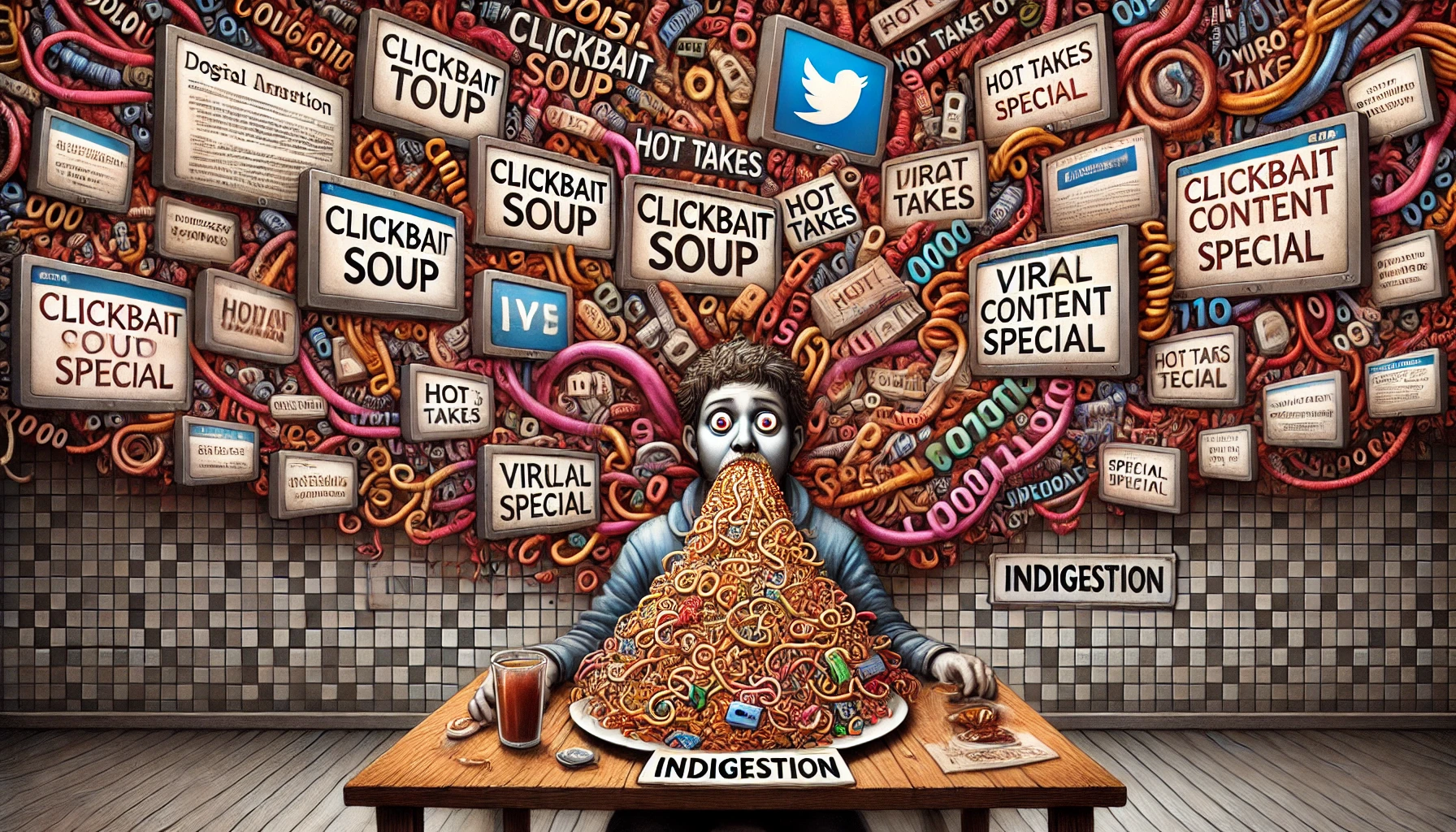















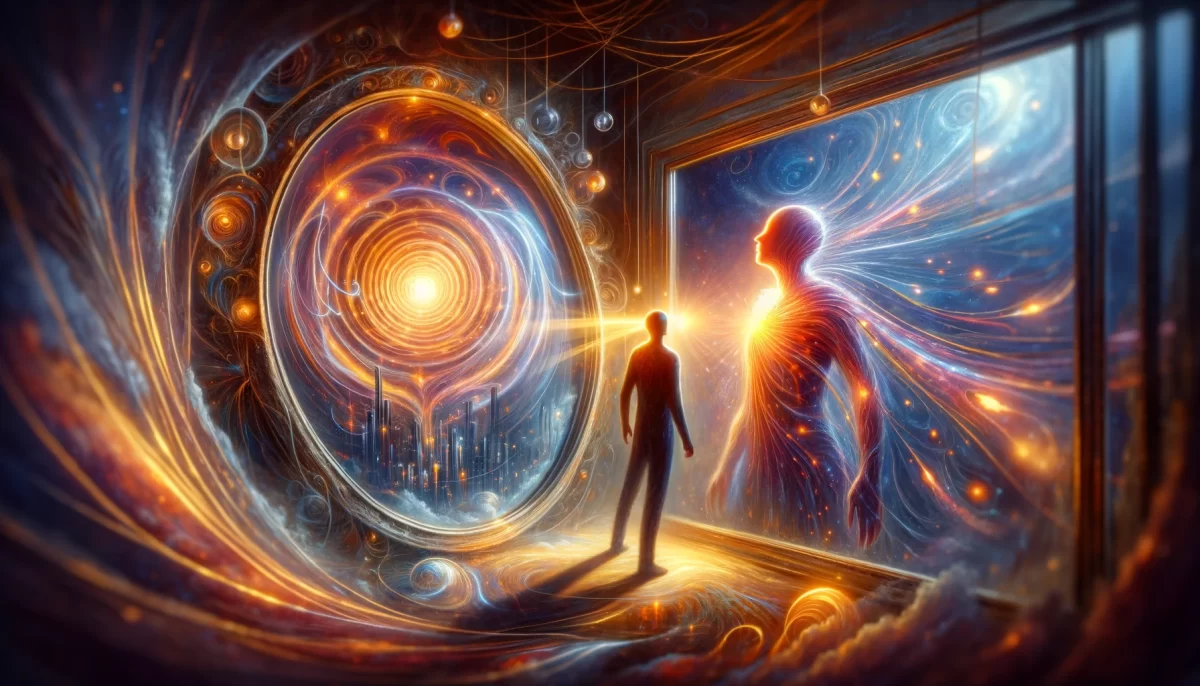








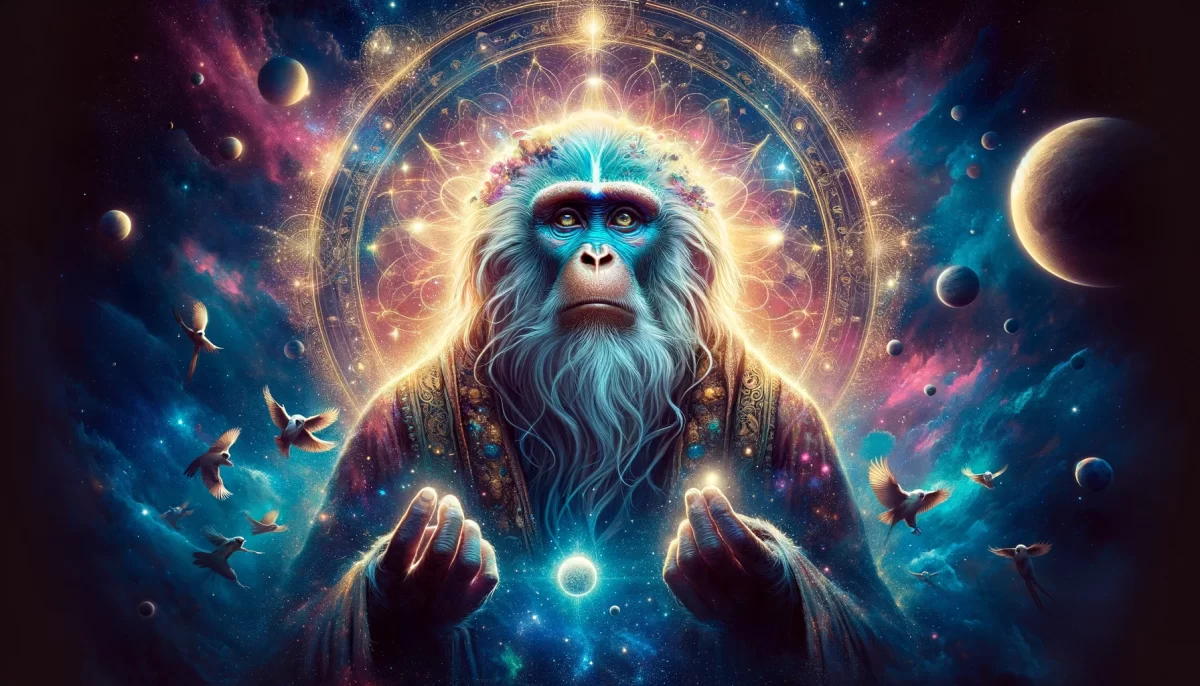

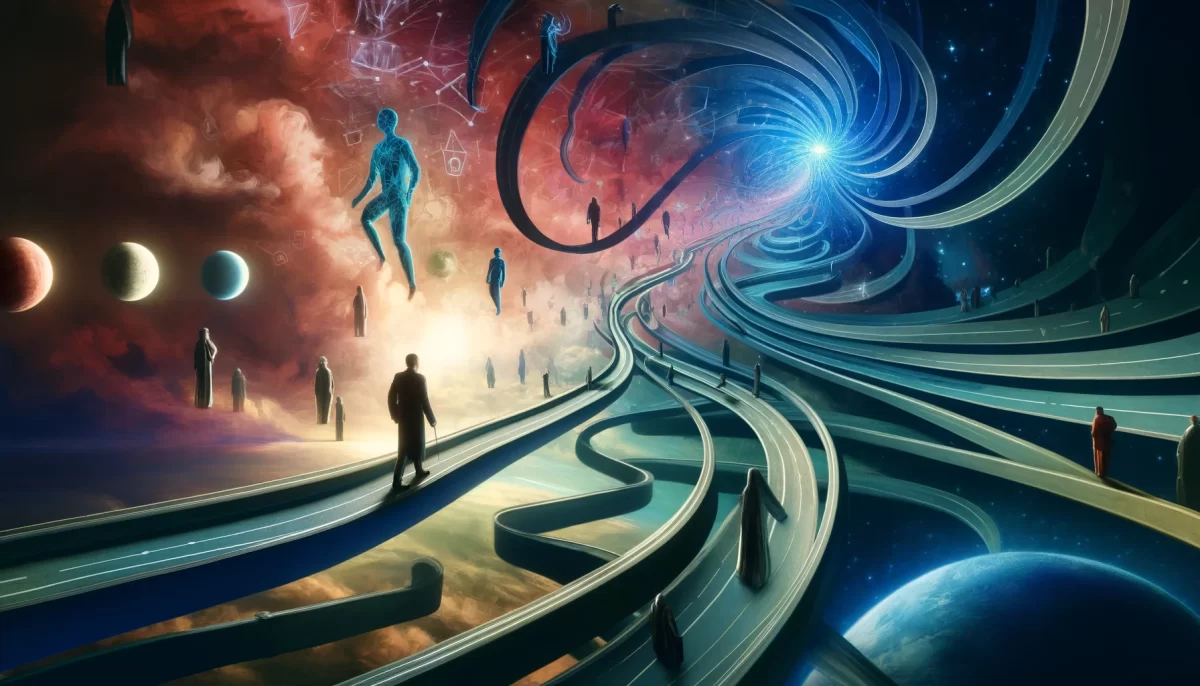

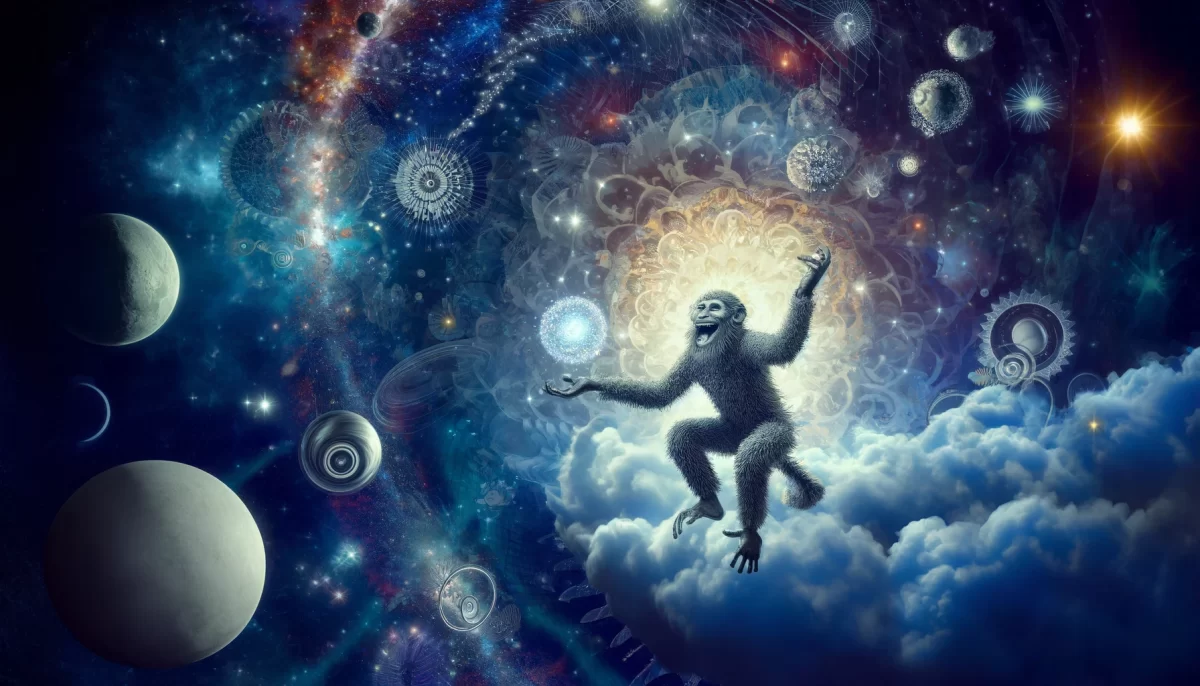
Leave a Reply